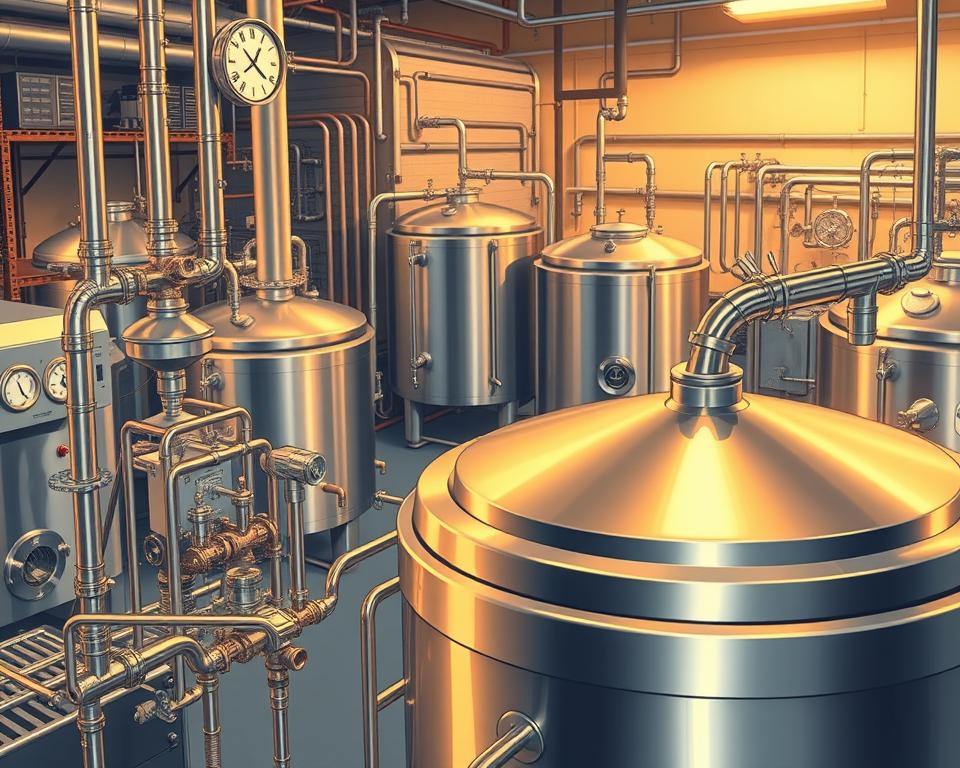Comprehensive Beer Brewing Equipment Guide for 2025
The craft of beer-making is becoming increasingly popular, with over a million home brewers in the United States alone. To produce top-tier beer, the right beer brewing equipment is vital.
At Installation Parts Supply, a broad selection of specialized beer brewing equipment can be found, catering to both novices and veteran brewers. From basic, 1-gal. beginner kits to high-tech, electric semi-automated systems that can produce up to 10 gallons of beer at a time, the appropriate tools can make a dramatic difference in the brewing process.
Choosing the right kit can be challenging, but with the right advice, brewers can attain their preferred outcomes. In this guide, we’ll explore the key products and equipment required for home brewing, allowing you to make superior beer with ease.
Top Highlights
- Understand the must-have beer brewing equipment for home brewers.
- Get familiar with the different types of brewing kits on the market.
- Uncover how to decide on the right equipment for your personal setup.
- Examine the newest developments in brewing technology.
- Understand how high-grade materials and construction influence brewing results.

Perfecting Your Brew with Top Equipment
The bedrock of outstanding brewing lies in the caliber of the equipment used. At Installation Parts Supply, we provide a hand-picked selection of brewing equipment meant to enhance your brewing experience.
- High-grade gear delivers repeatable outcomes batch after batch.
- Each item is engineered to simplify and enrich the brewing routine.
By owning quality brewing equipment, you’ll gain tighter heat regulation, higher extract yields, and better taste.
Understanding Beer Brewing Equipment Basics
The heart of effective home brewing lies in mastering the basics of beer brewing equipment. Every effective home brewing setup requires several essential components that collaborate to change raw ingredients into tasty beer.
Core Hardware for the Homebrewer
The brewing process generally uses equipment for converting, boiling, chilling, fermenting, and kegging. Quality equipment is pivotal for creating superior brews. A well-made SS boiler is a must-have component, offering an ideal vessel for the boil stage and hop dosing.
Steel, Aluminum, or Copper?
Stainless steel has emerged as the premium choice for brewing equipment due to its robustness and low-maintenance nature. Different materials like aluminum or copper may be cheaper but carry compromises in terms of service life and care. Installation Parts Supply provides a range of conical fermenter options, illustrating the importance of material choice in brewing equipment.
Conical fermenters signal a major upgrade from basic fermentation vessels, allowing for easier separation of beer from sediment. Temperature control systems are also crucial, keeping optimal conditions during fermentation, which substantially affects the final flavor profile of the beer.
Entry-Level Kits for New Brewers
Starting a home brewing journey needs the right equipment, and beginner brewing kits are the best starting point. These kits supply everything needed to brew a delicious batch of beer and are excellent for those new to brewing.
1-Gallon Starter Systems
Installation Parts Supply carries comprehensive 1-gallon starter systems that are great for brewing enthusiasts who want to learn the craft without a major expense. These small-footprint brewing kits are excellent for urban brewers or those with little storage.
Starter Kit Contents Explained
Beginner kits commonly provide basic tools like a fermentation vessel, airlock, thermometer, siphon, sanitizer, and bottling tools—everything necessary to complete the entire brewing process from start to finish. Fresh ingredients, including hops, grains, and yeast, are also provided to ensure a trouble-free first batch.
Level-Up Kits for Intermediate Brewers
Take your brewing to the next level with intermediate brewing systems from Installation Parts Supply. These systems are created for brewers who have conquered the basics and are ready to expand their batch sizes and brewing capabilities.
5 gallon Counter Cookers
The 5-gallon stovetop brewing kettles are a favorite choice among home brewers, delivering enough volume to create approximately two cases of beer per batch while fitting on most household ranges. These stainless steel kettles sport thick bottoms for consistent warmth and burn protection.
10g Gas-Fired Brewers
For larger batches, the 10-gallon propane-heated systems grant major capacity increases and take the operation al fresco. These systems feature a stainless steel grain and hop basket, enabling brewers to craft full-mash beers with ease.
High-Tech Electric Brew Platforms
Experience the peak of home brewing technology with Installation Parts Supply’s advanced electric brewing systems. These systems are engineered to deliver brewers with precision temperature control, hands-off steps, and industry-standard materials, perfect for both home brewers and nano-breweries.
Ten-Gal All-Electric Brew-in-a-Bag
The 10-gallon electric BIAB (Brew In A Bag) systems ease the brewing process while keeping complete control over every variable that shapes beer quality. These systems contain programmable controllers that can keep precise mash temperatures within 1 °F, enabling complex step-mashing profiles.
Twenty-Gal Pro-Series Systems
For dedicated hobbyists or small commercial operations, the 20-gallon systems give production-scale capacity with the same exact management and user-friendliness as their little siblings. These systems are packed with fast plate coolers and high-temperature pumps, enabling easy moves and whirlpooling during mashing.
Installation Parts Supply’s advanced electric brewing systems replace the need for propane burners, reducing indoor risk and lower in emissions. The commercial-grade stainless steel construction ensures these systems will withstand years of regular brewing, representing prudent spending for dedicated brewers.
Fermenting Essentials
The engine of the brewing process lies in fermentation equipment, where wort is metamorphosed into beer over several days or weeks.
Fermentation equipment is crucial for brewers, as it directly shapes the caliber of the final product. Installation Parts Supply stocks premium conical fermenters in multiple sizes.
Cone Fermenter Upsides
Conical fermenters have a sloped bottom that channels yeast and other solids, enabling clean separation without mixing up the finished beer above.
Temperature Control Solutions
Temperature control during fermentation is critical for flavor development, and Installation Parts Supply’s jacketed fermenters offer exact temperature control.
Advanced fermentation systems, such as the BrewBuilt X2 Jacketed Conical Fermenter (7 gal.), provide options such as sample taps and PRV-ready lids, showing the cutting edge of home brewing technology.
By upgrading to high-grade fermenters from Installation Parts Supply, brewers can secure consistency between batches, cut raw-material expenses, and yield brighter, longer-lasting brews.
Key Add-Ons for Better Beer
Brewing great-tasting beer demands not just the right equipment, but also the right accessories. At Installation Parts Supply, we stock a broad range of products meant to enhance brewing efficiency, repeatability, and result.
Pumps and Transfer Systems
Top-tier pumps are essential for high-level setups, facilitating the pumping of hot wort between vessels while holding heat and cutting O2 exposure. Installation Parts Supply’s adjustable-flow brew pumps, like the MB® Variable Speed Brewery Pump, incorporate sanitary steel wet-ends and hefty engines that push 13.2 gallons per minute.
Cool-Down Solutions
Effective wort chillers are vital for quality brewing, as fast temperature drop locks in volatile oils and reduces contamination risk. Our plate chillers utilize opposed-flow tech to cool boiling wort to pitching temperatures swiftly.
Other essential accessories include transfer systems with silicon tubing and flow control valves, temperature management tools like digital controllers and thermowells, and sanitary sprayers and CIP gear. Measurement tools such as refractometers and pH meters enable brewers to make data-driven decisions, resulting in more consistent outcomes.
By integrating these accessories into your brewing setup, you can markedly upgrade your brewing speed and brew pub-grade beer every time.
Measuring and Testing Equipment
For brewers pushing boundaries, measuring and testing equipment is vital. Precise measurement and testing equipment from Installation Parts Supply lets brewers to achieve uniform batches by eliminating guesswork from the brewing process.
Accuracy Tools for Brewers
Digital thermometers with stainless steel probes give accurate temperature readings throughout the brewing process. Hydrometers and refractometers let brewers to measure the specific gravity of their wort and beer, calculating alcohol content and monitoring fermentation progress.
Programmable Brew Management
Installation Parts Supply provides advanced digital controllers that can manage temperature ramps, holds, and cooling cycles. These controllers improve consistency between batches and free brewers from constant monitoring.
Other essential tools include pH meters, water testing kits, dissolved oxygen meters, flow meters, and pressure gauges. These tools aid brewers in holding optimal conditions during brewing, fermentation, and packaging, ultimately causing better beer quality.
The integration of digital controllers with multiple hardware pieces yields part-auto setups that merge the craft aspects of brewing with the precision and consistency of commercial operations.
Putting Beer in Glass & Steel
For home brewers, the right bottling and packaging solutions can make all the difference in their final product. Installation Parts Supply stocks thorough bottling and packaging solutions that help preserve the quality of your homebrew and boost shelf appeal.
Bottle Cappers and Supplies
Bottle cappers vary from simple hand-operated models perfect for small batches to bench cappers that provide leverage advantages for larger bottling runs, reducing fatigue and guaranteeing tight caps. High-quality crown caps with oxygen-absorbing liners fight staling, maintaining the crisp character of your beer over time and extending its shelf life.
Draft Solutions for DIY Brewers
For brewers looking to move beyond bottling, Installation Parts Supply carries complete kegging systems that simplify packaging while offering the authentic draft experience for your homebrew. Cornelius (Corny) kegs in 2.5 and 5-gallon sizes provide the perfect solution for home brewers, blending simple sanitation, pressure capability, and fit with common taps.
CO₂ regulators, gas tanks, and dispensing equipment are available as complete kits, equipping brewers everything needed to condition and dispense their beer with bar-quality output. Transfer equipment made for closed transfers keeps aromas bright and halts staling during the critical transfer from fermenter to bottle or keg.
Bottle fillers with counter-pressure capabilities enable filling without CO₂ loss, cutting sediment production and reducing sediment in the finished product. Installation Parts Supply stocks plenty of both standard amber 12 oz bottles and custom shapes for those wanting signature style for their homebrew.
Kegging systems significantly reduce packaging time compared to bottling, allowing brewers to package a 5-gallon batch in minutes rather than the long stretch needed for full bottle runs.
Choosing Equipment Wisely
Selecting the right beer brewing equipment is key for producing great brews. Whether you’re a pro-level homebrewer or new to the craft, investing in the right equipment can make a significant difference in your brewing experience.
Matching Equipment to Your Experience Level
Beginners should start with a entry brewing kit that bundles must-have pieces, while veterans can upgrade specific equipment such as fermentation temperature controllers to optimize their brewing process.
Spending Wisely on Brew Gear
When choosing beer brewing equipment, factor in both the upfront price and long-term value. Stainless steel equipment may be pricier at first but lasts longer and cleans easier, yielding strong ROI for serious brewers.
At Installation Parts Supply, brewers can find a variety of equipment to meet their goals, from beginner-friendly kits to advanced systems. By looking at factors such as experience level, budget, and brewing goals, brewers can choose wisely when buying their equipment.
Wrap-Up: Raise Your Brew Game with IPS
Installation Parts Supply is your full-service supplier for all your beer brewing equipment needs, from beginner kits to advanced systems.
Our expansive selection evolves with your skills and ambitions, ensuring you have the right tools for consistent, professional-quality results.
With a focus on quality and a expert support available for guidance, we back your home brewing goals. Browse online or get in touch with our team today to boost your brewing experience.









